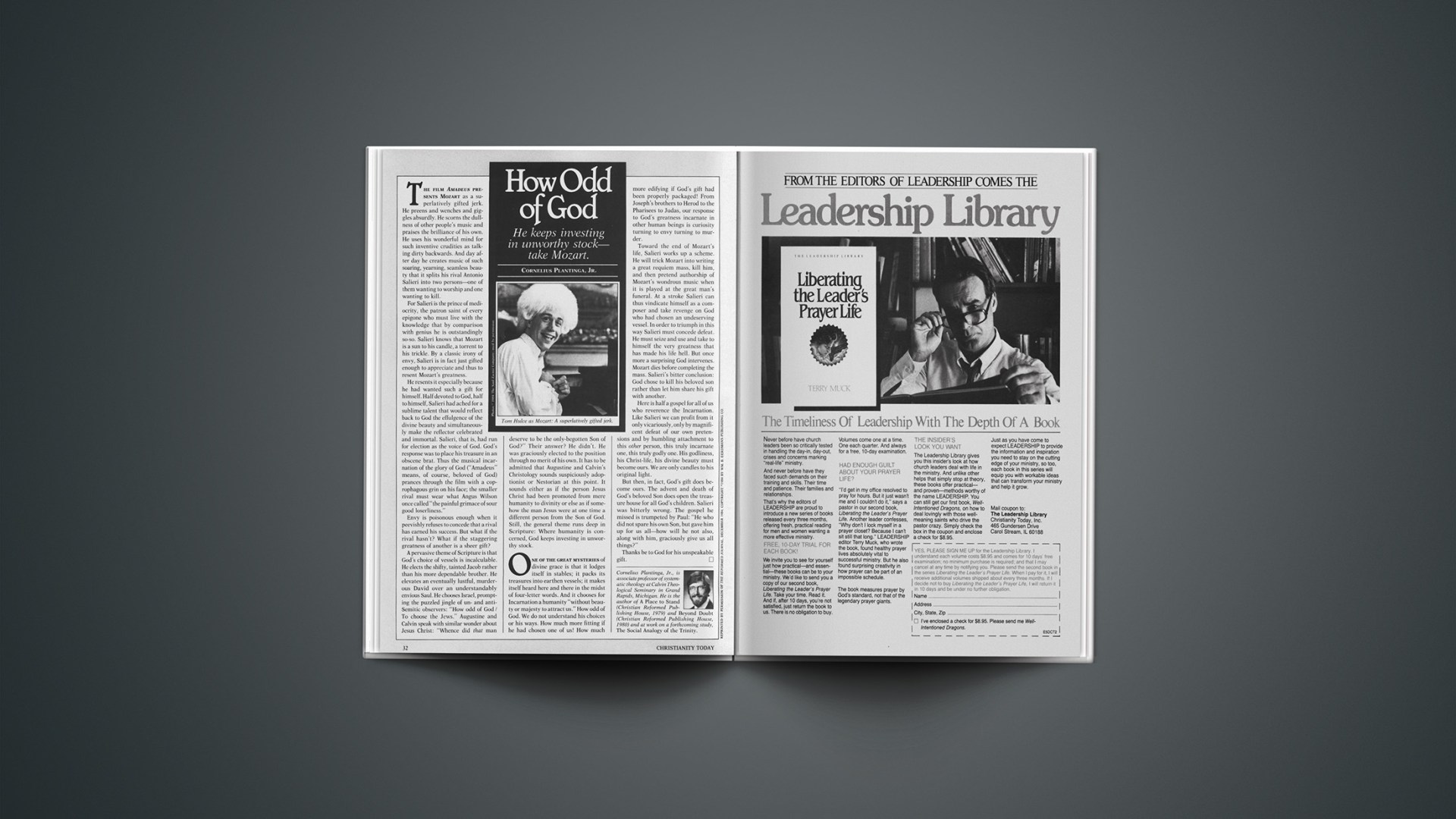He Keeps investing in unworthy stock—take Mozart.
The film Amadeus presents Mozart as a superlatively gifted jerk. He preens and wenches and giggles absurdly. He scorns the dullness of other people’s music and praises the brilliance of his own. He uses his wonderful mind for such inventive crudities as talking dirty backwards. And day after day he creates music of such soaring, yearning, seamless beauty that it splits his rival Antonio Salieri into two persons—one of them wanting to worship and one wanting to kill.
For Salieri is the prince of mediocrity, the patron saint of every epigone who must live with the knowledge that by comparison with genius he is outstandingly so-so. Salieri knows that Mozart is a sun to his candle, a torrent to his trickle. By a classic irony of envy, Salieri is in fact just gifted enough to appreciate and thus to resent Mozart’s greatness.
He resents it especially because he had wanted such a gift for himself. Half devoted to God, half to himself, Salieri had ached for a sublime talent that would reflect back to God the effulgence of the divine beauty and simultaneously make the reflector celebrated and immortal. Salieri, that is, had run for election as the voice of God. God’s response was to place his treasure in an obscene brat. Thus the musical incarnation of the glory of God (“Amadeus” means, of course, beloved of God) prances through the film with a coprophagous grin on his face; the smaller rival must wear what Angus Wilson once called “the painful grimace of sour good loserliness.”
Envy is poisonous enough when it peevishly refuses to concede that a rival has earned his success. But what if the rival hasn’t? What if the staggering greatness of another is a sheer gift?
A pervasive theme of Scripture is that God’s choice of vessels is incalculable. He elects the shifty, tainted Jacob rather than his more dependable brother. He elevates an eventually lustful, murderous David over an understandably envious Saul. He chooses Israel, prompting the puzzled jingle of un- and anti-Semitic observers: “How odd of God / To choose the Jews.” Augustine and Calvin speak with similar wonder about Jesus Christ: “Whence did that man deserve to be the only-begotten Son of God?” Their answer? He didn’t. He was graciously elected to the position through no merit of his own. It has to be admitted that Augustine and Calvin’s Christology sounds suspiciously adoptionist or Nestorian at this point. It sounds either as if the person Jesus Christ had been promoted from mere humanity to divinity or else as if somehow the man Jesus were at one time a different person from the Son of God. Still, the general theme runs deep in Scripture: Where humanity is concerned, God keeps investing in unworthy stock.
One of the great mysteries of divine grace is that it lodges itself in stables; it packs its treasures into earthen vessels; it makes itself heard here and there in the midst of four-letter words. And it chooses for Incarnation a humanity “without beauty or majesty to attract us.” How odd of God. We do not understand his choices or his ways. How much more fitting if he had chosen one of us! How much more edifying if God’s gift had been properly packaged! From Joseph’s brothers to Herod to the Pharisees to Judas, our response to God’s greatness incarnate in other human beings is curiosity turning to envy turning to murder.
Toward the end of Mozart’s life, Salieri works up a scheme. He will trick Mozart into writing a great requiem mass, kill him, and then pretend authorship of Mozart’s wondrous music when it is played at the great man’s funeral. At a stroke Salieri can thus vindicate himself as a composer and take revenge on God who had chosen an undeserving vessel. In order to triumph in this way Salieri must concede defeat. He must seize and use and take to himself the very greatness that has made his life hell. But once more a surprising God intervenes. Mozart dies before completing the mass. Salieri’s bitter conclusion: God chose to kill his beloved son rather than let him share his gift with another.
Here is half a gospel for all of us who reverence the Incarnation. Like Salieri we can profit from it only vicariously, only by magnificent defeat of our own pretensions and by humbling attachment to this other person, this truly incarnate one, this truly godly one. His godliness, his Christ-life, his divine beauty must become ours. We are only candles to his original light.
But then, in fact, God’s gift does become ours. The advent and death of God’s beloved Son does open the treasure house for all God’s children. Salieri was bitterly wrong. The gospel he missed is trumpeted by Paul: “He who did not spare his own Son, but gave him up for us all—how will he not also, along with him, graciously give us all things?”
Thanks be to God for his unspeakable gift.










